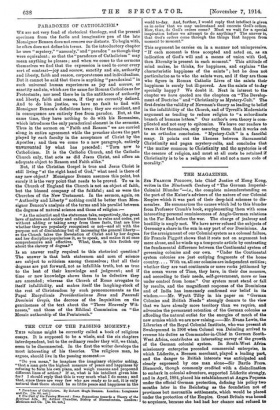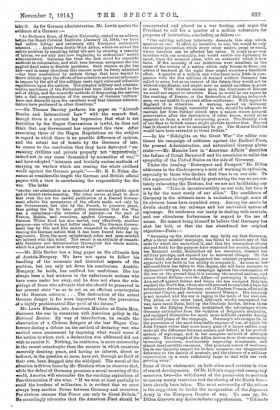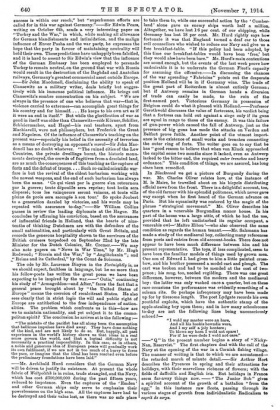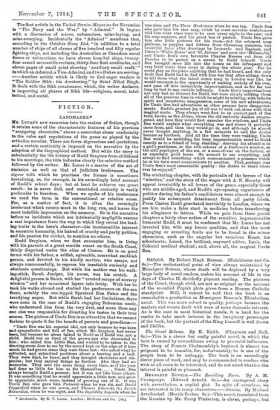THE MAGAZINES.
Sm. FRANCIS PIGGOTT, late Chief Justice of Hong Kong, writes in the Nineteenth Century of "The German Imperial- Colonial Blunder "—i.e., the complete misunderstanding on the part of the Kaiser's advisers of the nature of our Colonial Empire which it was part of their deep-laid schemes to dis- member. He summarizes the causes which led to this blunder from Professor Cramb's book, supplementing them with some interesting personal reminiscences of Anglo-German relations in the Far East before the war. The charge of jealousy and hostility is amply met. We have never refused the subjects of Germany a share in the sun in any part of our Dominions. As for the arraignment of our Colonial system as a colossal failure, Sir Francis Piggott shows that it rests not on argument but mere abuse, and he winds up a temperate article by contrasting the fundamental difference between the Continental system of governing colonies and our own. "Under the Continental system colonies are just outlying fragments of the home country. . . . With us, all our colonies are independent entities ; whether they are vast continents or mere rocks jettisoned by the ocean waves of Time, they have, in their due measure, and according to their needs, self-government, more or less under control from home." Our system must stand or fall by results, and the magnificent response of the Dominions and of India has immensely confirmed our belief in its wisdom.—Mr. Wyatt Tilby in his paper on "German Colonies and British Needs" strongly demurs to the view that we have already more territory than we require, and advocates the permanent retention of the German colonies as affording the natural outlet for the energies of much of the new armies which we are now raising.—Mr. Evans Lewin, the Librarian of the Royal Colonial Institute, who was present at Swakopmund in 1906 when Colonel von Deimling arrived to resume his duties as Commander-in-Chief in German South. West Africa, contributes an interesting survey of the growth of the German colonial system. In South-West Africa missionary enterprise preceded commercial enterprise, in which Liideritz, a Bremen merchant, played a leading part, and the danger to British interests was anticipated and clearly expressed by one man alone—Sir Bartle Frere. Bismarck, though commonly credited with a disinclination to embark in colonial adventure, supported Liideritz strongly, and in April, 1884, placed his establishment at Angra Pequena under the official German protection, defining his policy two months later in the Reichstag as the foundation not of provinces but mercantile settlements, which would be placed under the protection of the Empire. Great Britain was bound to acquiesce, because she had had her chance and refused to
take it. As for German administration, Mr. Lewin quotes the evidence of a German :-
"As Professor Bonn, of Munich University, stated in an address before the Royal Colonial Institute (January 13, 1914), we have had native risings and extremely silly European settlement schemes. . . . Apart from South-West Africa, where we solved the native problem by smashing tribal life and by creating a scarcity of labour, we are only just now beginning to understand' native administration. Germany has from the first stood for scientific methods in colonisation, and with true German arrogance she has applied fixed rules to flexible problems. Such success as she has had—and in many directions this success must be freely admitted —has been neutralised by certain things that have tended to throw ridicule upon the efforts of her scientists and social reformers to impose by the aid of the military caste rigid rules and inflexible regulations upon the natives. The complex military and adminis- trative machinery of the Fatherland has been little suited to the soil of Africa, and the scientific methods of dragooning the natives into a drill comprehension of the meaning of German 'culture' have cast discredit upon the excellent work that German adminis- trators have performed in other directions."
Thomas Barclay prefaces his paper on "Aircraft Bombs and International Law" with the remark that,
though there is a current lay impression that what is not forbidden by the Hague Conventions is lawful, he does not think that any Government has expressed this view. After examining those of the Hague Regulations on the subject
in regard to which there is no possible difference of opinion, and the actual use of bombs by the Germans of late, be comes to the conclusion that they have destroyed " un- resisting civilians and private property not 'imperatively,' indeed not in any sense demanded by necessities of war," and have adopted "inhuman and brutally useless methods of carrying on warfare which are rousing the whole civilised world against the German people."—Mr. R. S. Nolan dis- cusses at considerable length the German and British official papers with a view to ascertaining the responsibility for the war. The latter "excites our admiration as a memorial of universal public spirit and of honest statesmanship. The other serves at least to show that even the not too candid publication of a biassed Govern- ment admits the earnestness of the efforts made, not only by our Government, but also by the French, to preserve peace, thus giving the lie to later public statements that the War was a conspiracy—the outcome of jealousy—on the part of France, Russia, and ourselves, against Germany. But the German White Book has also served, very effectively, another purpose—one which we had better realise. The German Govern- ment has by this and like means aucceeded in absolutely con- vincing the German nation that it has been forced into war by aggressors. Even the most enlightened, sober and open-minded are imbued with this belief. The result is an attitude of remark- able keenness and determination throughout the whole nation, which is a great asset to a country at war."
—Mr. Ellis Barker has a long paper on the ultimate fate of Austria-Hungary. We have not space to follow his handling of the economic and historical aspects of the
problem, but can only set down his conclusions. Austria- Hungary, he holds, has outlived her usefulness. She has always been a bad mistress to the unfortunate nations who have come under her sway, and he does not share the mis. givings of those who advocate that she should be preserved in her present state "so as to act as an efficient counterpoise
to the Russian colossus. . . . The destruction of the actual German danger is far more important than the prevention of a highly problematical Slav peril of the future."
Mr. Lewis Einstein, late American Minister at Costa Rica, discusses the war in connexion with American policy in the National Review. By way of introduction, he recalls the observation of a Chinese delegate at the last Hague Con- ference during a debate on the method of declaring war, who excited some amusement by inquiring what would occur if the nation to whom such a declaration was addressed did not wish to receive it. Nothing, he continues, is more noteworthy in the recent catastrophe than the manner in which countries earnestly desiring peace, and having no interest, direct or indirect, in the question at issue, have yet, through no fault of their own, been dragged into the whirlpool. The moral of the situation is driven home by Mr. Einstein when he observes that,
while the defeat of Germany promises a moral recasting of the world, America will encounter the far-reaching aspirations of
Pan-Germanism if she wins. "If we wish at least partially to avoid the burdens of militarism, it is evident that we must always keep another Power between Germany and ourselves. For obvious reasons that Power can only be Great Britain." Be accordingly advocates that the American Fleet should be concentrated and placed on a war footing, and urges the President to call for a quarter of a million -volunteers for purposes of instruction, concluding as follows :— "Our existing military inferiority demands this step which menaces no one. It offers no incentive to war, but would be only the natural precaution which every other nation, great or small, whose interests can be affected has taken. It could in no way interfere with our neutrality, but would enable our diplomacy to speak, when the moment came, with an authority which it now lacks. If the meaning of our intentions were manifest, in the event of the victory of a nation which only listens to force, our advice if tendered at the right time might exercise a beneficial effect. A quarter of a million raw volunteers seem little in com- parison with the five millions of trained soldiers Germany has called to arms, but as an earnest of the future they would not be without significance, and might save us untold sacrifices in years to come. With German MCCAW' upon the Continent of Europe we could not expect to interfere. Keen as would be our regret at the crushing of France, or the destruction of Belgian independ- ence, we are unable to prevent either misfortune. With regard to England it is otherwise. A warning served on Germany exhausted even though successful in war, should be adequate to restrain her from further attack upon a nation whose integral preservation after the destruction of other forces, would alone separate us from a world conquering power. The friendly visit of our fleet to British waters might provide another hint. Beyond that it should not now be necessary to go. The Monroe Doctrine would have been extended to Great Britain."
In his "Sidelights on the Great War" the editor con- tinues his campaign of criticism against the Radical Press, the present Administration, and naturalized German pluto-
crats.—Mr. Maurice Low in "American Affairs" describes the failure of Count Bernstorff and his associates to enlist the sympathy of the United States on the side of Germany.
Under the heading "Retrospect and Prospect" Dr. Dillon addresses in the Contemporary a note of warning to optimists, especially to those who declare that time is on our aide. To this argument be replies that by protracting the war we are cer- tainly exhausting the Teutons, but we are not facilitating our own task. "Time is incontrovertibly on our side, but then it is by far the most costly of our allies." The confidence of Germany in the ultimate issue is unshaken, though some of its obvious bases have crumbled away. Among her assets he dwells chiefly on her railways and her unrivalled system of espionage. He condemns our laxity in dealing with neutrals, and our chivalrous forbearance in regard to the use of mines. He cannot bring himself to believe that Germany ha shot her bolt, or that she has abandoned her original
objective—Paris :—
" Summing up the situation one may fairly say that Germany, after a three months' campaign, has failed to achieve any of the ends for which she undertook it, and that the tremendous efforts she put forth for the purpose have weakened her armies, impaired her financial credit, diminished all her resources, dimmed her military prestige, and exposed her to universal obloquy. On the other hand, she has not relinquished her original programme, nor apparently lost faith in her ability to compass it. As soon as her- self-confidence has fallen to this degree, she will have recourse to diplomatic intrigue, begin a campaign against the continuation of the war on the ground that it is ruining the neutral nations, and accuse Great Britain—not the Allies—of prolonging it wantonly. As a set-off against failure and losses she has occupied Belgium, reached the North Sea, where she will proceed to establish a base for submarines; driven the Russians out of Eastern Prussia, effectually protected Cracow, and seriously menaced Warsaw. Her territory is not invaded, and the war is raging in the lands of her enemies. The Allies, on the other hand, although -wholly unprepared for war, have saved Paris, held up the Teutonic hordes, driven them back to the Belgian frontier, neutralised the advantages which Germany anticipated from the violation of Belgium's neutrality, and equipped themselves for much more brilliant exploits during the second phase of the campaign. Germany's advantages lie in the possession of the most formidable engines of war, of which Sir John French writes that more heavy guns of a larger calibre may snake all the difference between success and defeat ; in her perfect system of espionage, and in her complete network of strategic railways. The strength of the Allies derives from their constantly increasing numbers, continuously improving armaments, and almost inexhaustible resources. Our principal source of weakness lies in our Quixotic respect for broken compacts, our exaggerated deference to the desires of neutrals, and the absence of a military organisation on a scale sufficiently large to deal with our ever growing army."
Some of these statements on both sides need revision in view of recent developments. Of Dr. Dillon's suggested emergency measures, two—the withdrawal of the permission to neutrals to convey enemy reservists and the closing of the North Sea— have already been taken. The most noteworthy of the others is the suggestion to invite the co-operation of the Japanese Army in the European theatre of war. To sum up, Dr. Dillon disavows any desire to foster apprehension. "Ultimate success is within our reach," but "superhuman efforts are called for in this war against Germany."—Sir Edwin Pears, writing on October 6th, sends a very interesting paper on "Turkey and the War," in which, while making all allowance
for German blandishments and intimidation, and the malign influence of Enver Pasha and the war party, he expresses the hope that the party in favour of maintaining neutrality will hold their own. These predictions have unhappily been falsified, and it is hard to assent to Sir Edwin's view that the influence of the German Embassy has been employed to persuade Turkey to remain neutral, on the ground that war with Russia would result in the destruction of the Baghdad and Anatolian railways, Germany's greatest commercial asset outside Europe. —Sir John Macdonell, disclaiming the ability to speak of Clau.sewitz as a military writer, deals briefly but sugges- tively with his immense political influence. He brings out Clausewitz's sombre concentration on his subject. "We are always in the presence of one who believes that war—that is, violence carried to extremes—can accomplish great things for his country and for himself.... He keeps to his own art as if it were an end in itself." But while the glorification of war as good in itself was older than Clausewitz—vide Korner, Schiller, Schleiermacber, and Hegel—his real teachers, apart from Machiavelli, were not philosophers, but Frederick the Great and Napoleon. Of the influence of Clausewitz's teaching on the present war—especially his belief in the necessity of terrorism as a means of destroying an opponent's moral—Sir John Mac- donell has no doubt whatever. "The ruined cities of the Low Countries, the private dwellings burnt, the historic monu- ments destroyed, the crowds of fugitives from a desolated land, are as much the consequences of this teaching as the capture of forts and tho defeat of troops. , Such so-called scientific war- fare is but the revival of the oldest barbarism working with the newest weapons, and the end of such barbarism has always been the same. Ce qui vient par la guerre s'en retournera
par in guerre; toute depouille sera reprise ; tout butin sera disperse; tons lee vainqueurs seront vaincus, et toute ville pleine de prole sera saccagee A son tour.' So spoke Joubert to a generation dazzled by victories, and his words may be repeated with assurance to-day."—Sir William Collins passes in review the leading diplomats at the Hague. He concludes by affirming his conviction, based on the assurances of influential friends in Holland, that the hearts of nine- tenths of thinking Dutchmen are with the defenders of the small nationalities, and particularly with Great Britain, and records the generous hospitality shown to the survivors of the British cruisers torpedoed on September 22nd by the late Minister for the Dutch Colonies, Mr. Cremer.—We may also note papers on "News in War Time," by Mr. Hugh Redwood; "Russia and the War," by " Anglitchanin "; and "Reims and its Cathedral," by the Count de Soissons.
The ode by Mr. Laurence Binyon in the Fortnightly is, as we should expect, faultless in language, but he no more than his fellow-poets has written the great poem we have been expecting to be inspired by the war.—" Ontis," continuing his study of "Armageddon—and After," faces the fact that a general peace brought about by "the United States of Europe" means the coercion of recalcitrant States. He also sees clearly that in strict logic the will and public right of Europe are antithetical to the free independence of nation- alities. The problem which confronts us is this—how are we to maintain nationality, and yet subject it to the cosmo- politan spirit? The conclusion he arrives at is the following:—
" The mistake of the pacifist has all along been the assumption that bellicose impulses have died away. They have done nothing of the kind, and are not likely to do so. But, happily, all past experience in the world's history shows us that ideas in a real sense govern the world, and that a logical difficulty is not necessarily a practical impossibility. In this case, as in others, a noble and generous idea of European peace will gradually work its own fulfilment, if we are not in too much of a hurry to force the pace, or imagine that the ideal has been reached even before the preliminary foundations have been laid."
—Mr. Archibald Hurd considers that the German Navy will be driven to justify its existence. At present the whole fabric of Weltpolitik is in ruins, trade strangled, and the Navy, which has cost 2300,000,000 during the past fifteen years, reduced to impotence. Even the captures of the 'Emden' and other German ships only serve to emphasize their powerlessness on the high seas. All the captures have had to be destroyed and their value lost, as there was no safe place
to take them to, while one successful action by the Cumber- land ' alone gave us enemy ships worth half a million.
Altogether, we have lost 1.6 per cent. of our shipping, while Germany has lost 18 per cent. Mr. Hurd rightly says how
fortunate it was that England turned a deaf ear to those evil counsellors who wished to reduce our Navy and give us a free breakfast-table. "If this policy had been adopted, by this time our breakfast-tables would have been free,' but they would also have been bare." Mr. Hurd's main contentions are sound enough, but the events of the last week prove how undesirable it is to underrate the German Fleet's capacity for assuming the offensia e.—In discussing the chances of the war spreading " Fabricius" points out the desperate position Holland will be in if Germany wins. The trade of the great part of Rotterdam is almost entirely German ; but if Antwerp remains in German hands a diversion of trade can easily be made, to the ruin of the first-named port. Victorious Germany in possession of Belgium could do what it pleased with Holland.—Professor Gerothwohl discusses the value of fortresses, his verdict being that a fortress can hold out against a siege only if its guns are equal in range to those of the enemy. It was this failure of gun-power which caused the fall of Antwerp, just as the presence of big guns has made the attacks on Verdun and Belfort prove futile. Another point of the utmost import- ance is the existence of small works and trenches connecting the outer ring of forts. The writer goes on to say that he has "good reason to believe that when von Kluck approached the capital some two months since it lacked, even as Antwerp lacked to the bitter end, the required outer trenches and heavy ordnance." This condition of things, we are assured, has long since been remedied.
In Blackwood we get a picture of Burgundy during the war. Mr. Charles Oliver relates how, at the instance of M. le Maire, he travelled about on his bicycle distributing official news from the front. There is a delightful account, too, of the old farmer with his splendid politeness, which never gave way except when he first heard of the German advance on Paris. But his equanimity was restored by the magic of the phrase "strategical movement." Mr. Oliver describes his
quarters in a venerable Burgundian manor house. In his part of the house was a large attic, of which he had the use, provided that he left undisturbed its regular occupant, a venerable owl—' Maitre Hibou '—who also observed the same condition as regards the human tenant.—Mr. Salzmann has made a study of the mediaeval boy, collecting many references from poets and entries from old account-books. There does not appear to have been much difference between him and his present representative. The toys, if less complicated, seem to have been the familiar models of things used by grown men. One son of Edward I. had given to him a little painted cross- bow, and his brother possessed a model cart and plough. The cart was broken and had to be mended at the coat of two- pence ; his mug, too, needed regilding. There was one great difference, however, between the modern and the mediaeval boy : the latter was only washed once a quarter, but on these rare occasions the performance was evidently something of a solemn rite. So perhaps infrequency may have been made up for by tiresome length. The poet Lydgate records his own youthful exploits, which have the authentic stamp of the apple-stealing boy upon them ; and in how many schoolrooms to-day are not the following lines being unconsciously
echoed ?—
"I wold my master were an hare, And all his bookie howndis were, And 1 my self a joly hontere ; To blowe my horn I wold not spare! For if he were dede I wold not care."
" Q" in the present number begins a story of " Nicky- Nan, Reservist." The first chapters deal with the call of the Navy at the opening of the war in a Cornish fishing village. The manner of writing is that to which we are accustomed— the retarded march of minute detail.—Sir Arthur Hort describes the Pyrenees in spring and their attractions for holidays, with their marvellous richness of flowers; with the fields of daffodils and English iris. But holidays in France seem far-away things now. — "The Junior Sub" gives a spirited account of the growth of a battalion "from the egg," in this instance raw Scots, passing through its various stages of growth from individualistic Radicalism to esprit de corps. The first article in the United Service Magazine for November is "The Navy and the War," by " AdmiraL" It begins with a discussion of mines, submarines, mine-laying, and mine-sweeping. Incidentally the " Admiral " mentions that, according to the October Navy List, "in addition to a total number of ships of all classes of five hundred and fifty regular fighting ships, not including the Australian or Canadian naval forces or submarines, we have eleven hospital ships, twenty- four armed mercantile cruisers, thirty-four fleet auxiliaries, and eleven pages of small print showing auxiliary small craft," in which an Admiral, a Vice-Adm iral, and two Dukes are serving. —Another article which is likely to find eager readers is "The Soldier Sikh : his Awakening," by Saint Nihal Singh. It deals with the Sikh renaissance, which, the writer declares, is improving all phases of Sikh life—religious, moral, intel- lectual, and social.

















































 Previous page
Previous page